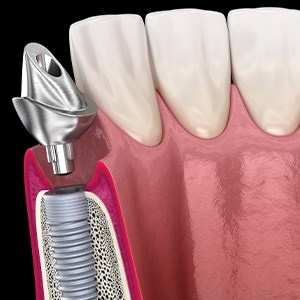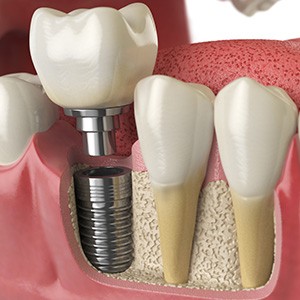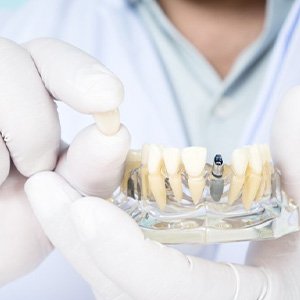Dental Implants Carrollton
A State-of-the-Art Answer to Tooth Loss

Dental implants are a long-lasting choice that are as close as possible to growing new teeth. They function as a sturdy anchor for porcelain crowns that look and function so life-like you may completely forget they aren’t your natural teeth. What’s more, dental implants in Carrollton are also an excellent choice for providing strong, stable support for dentures. Implant dentistry is a service that offers one of the best values in modern health care while also allowing you to regain your sense of confidence about your smile. Contact the best implant dentist Carrollton has to offer today.
The 4-Step Dental Implant Process

Dental implants differ from dentures and dental bridges, so their treatment process takes a few months. That said, the fact remains that they’re worth the time and effort; Dr. Jordan places the implants himself using the latest dental technology. You can trust you’ll get the best results and enjoy a beautifully restored smile. In terms of overall care, the implant process involves four stages: consultation, surgery, osseointegration, and delivery of the final restoration.
Initial Dental Implant Consultation

To start off, you’ll meet Dr. Jordan for a brief consultation. This session lets him learn your treatment goals, oral health background, and several other key factors. He’ll use that feedback to determine whether dental implants suit you and adjust your final procedure(s).
Should we decide you don’t qualify for dental implants, don’t panic. You can become a good candidate later through extra dental work – gum disease treatment, tooth extractions, etc. We’ll even help you arrange those services so your mouth is strong enough for implant posts.
Dental Implant Surgery

As stated earlier, our office does dental implant surgery in-house. Dr. Jordan takes this approach to ensure the posts are well-placed and don’t cause any major side effects. Plus, it should save you time otherwise spent seeing an outside oral surgeon.
The implant surgery will involve several essential steps. First, our team will numb the treatment site to prevent aches during work. We’ll then make a small incision in your gums to create room for the final implant post. Next, we’ll precisely place the implant before suturing your gums shut. Dr. Jordan will wrap things up by putting a protective cap over the now-set post.
Dental Implant Osseointegration & Abutment

Your dental implant will slowly fuse with your jaw after the surgery. This healing period (called ‘osseointegration’) takes about 4-6 months, leaving your “new tooth” fully secure. That means you’ll end your recovery with an implant that’s a permanent part of your mouth.
Once you’ve healed from implant fusion, you’ll undergo a follow-up surgery. We’ll place your abutment (i.e., a metal connector) at that session that secures your restoration. While you recover, a dental lab will craft the final prosthetic over a few weeks.
Delivery of Dental Implant Restoration(s)

Dr. Jordan will deliver your final restoration at the end of your implant treatment. Put another way, he’ll place a dental prosthetic that “matches up” with how many teeth you’ve lost. This device could range from a dental crown or bridge to an actual implant denture; it’ll depend on your situation.
All in all, it won’t take us long to fit your final restoration. The process mainly just needs us to apply some dental cement. Once that’s done, our team will make needed last-minute changes to ensure quality results. You’ll then be free to go out and enjoy having a full smile again!
Benefits of Dental Implants

Of all the options to replace your missing teeth, dental implants are unique because they’re the only restoration that’s directly embedded into your jaw. As a result, an estimated 500,000+ are placed every year, and it’s believed they will continue to gain popularity as technologies and techniques improve in time.
Their unique placement in your jawbone allows them to provide a variety of significant advantages over alternatives like dentures or dental bridges. Continue reading to learn more about their many benefits, and feel free to contact us for additional information.
Day-to-Day Benefits

Missing teeth can detract from your daily quality of life because they impede your ability to perform tasks that once felt like second nature. For example, without a full set, you might develop a lisp or have difficulty eating certain foods.
Thankfully, getting dental implants can enhance your day-to-day experience by:
- Enjoy your favorite meals. Once your jawbone fuses with the titanium rod of your implant, it’s so firmly rooted that it’s difficult to dislodge, so you don’t have to worry about dietary restrictions.
- Boost your confidence. Many patients feel self-conscious or anxious about gaps in their grins. Filling the space with an artificial tooth can improve your appearance and abilities to rebuild your self-esteem.
- Maintain your routine. You don’t have to worry about purchasing special cleaning solutions or removing your prosthetic to wash all its surfaces. Instead, brush and floss twice daily to remove bacteria and plaque that might cause oral issues like you usually do.
Health Benefits

Many patients don’t realize that their jawbone starts to thin after losing an adult tooth because there’s nothing in the socket to stimulate new bone growth when you bite down. The metal pole used to anchor your implants acts like a root to provide the following additional advantages for your oral health:
- Preserve your facial structure. As your jawbone degenerates, it alters the shape of your face and results in more sunken, saggy cheeks. Fortunately, your dental implants can restore a much more youthful visage.
- Prevent dental drifting. Your remaining teeth will likely shift out of alignment to try to fill in the gaps left behind by the ones that went missing, which can wear down the enamel and lead to damage or decay. Having dental implants placed ensures they remain in their proper positions.
- Avoid oral issues. Your restorations function as sturdy standalone structures, so it’s easier to reach all their surfaces to brush and floss them. This inhibits gum disease and cavities, safeguarding your smile.
Long-Term Benefits

Unlike dental bridges and dentures, dental implants are known to last 20+ years if they’re cared for correctly. As a result, you can enjoy several long-term advantages, such as:
- High success rate. These restorations have an incredibly high success rate of 95% or more, even up to 10 years after their initial placement.
- Fewer repairs. Because they’re so resilient, these artificial teeth typically don’t develop significant issues requiring them to be repaired or replaced, like dentures and dental bridges.
- Conserve resources. Since costly repairs are less likely with implants than with other prosthetics, you can potentially save time and money in the long run.
Understanding the Cost of Dental Implants

Understanding the cost of dental treatments can be tricky, especially since your exact price will depend on your unique situation and the number of treatments in your plan. That said, we don’t want you to arrive at your dental implant appointment totally blind!
There are several factors that can contribute to your overall treatment expenses, as well as multiple ways to lower your costs or make payment more manageable. You can contact our office with questions, and we’d be happy to discuss your financial options in more detail. In the meantime, feel free to read up on the information we’ve put together below to get a general sense of what to expect.
Preliminary Treatments & Dental Implant Surgery

Technically speaking, any preliminary treatments you’ll need to help ensure the success of your dental implants are counted as a separate expense from surgery. You might need one of these treatments if you don’t have enough bone mass in your jaw to support implants, have existing gum disease that could compromise your implants’ stability, or have unhealthy teeth that require extraction.
The Parts of Your Dental Implant

The physical details of the dental implant itself can also affect your final bill. Here are some examples:
- Getting one dental implant will be less expensive than getting four or six. If you’re looking to replace multiple teeth, an implant denture might be more cost effective.
- Depending on your jawbone, where the implant will be placed, and the size of any remaining natural teeth, your replacement may need to be longer or shorter. A longer implant means more material and tends to cost slightly more.
- Material and brand. Some implants are made from zirconia, which is a more specialized material than titanium. Different manufacturers have different formulas that cater to different needs, which can make sourcing your dental implant more or less pricey.
We understand that calculating your treatment costs and knowing what your dental implant is made of is important, so don’t hesitate to ask us where it’s coming from!
How Dental Implants Can Save You Money

It’s true that out of all your tooth replacement options, dental implants often have the highest upfront costs. However, unlike dentures or bridges, dental implants can preserve your jawbone, preventing deterioration and saving you from costly treatments down the road. You’ll also end up spending less on replacements, adjustments, special cleaning products, and adhesives.
Does My Dental Insurance Cover Dental Implants?

Not all dental insurance policies cover dental implants; if they do, they typically offer partial coverage. If you’re unsure what your plan will pay for, you can reach out to our friendly team. We have plenty of experience handling dental insurance and can help you navigate your benefits.
Making Dental Implants Affordable

For patients without dental insurance, CareCredit is an excellent way to make dental implant treatment more affordable. They have payment plans with little-to-no interest rates available and can break your final bill down into more manageable monthly chunks. Many of our patients appreciate being able to pay at their own pace, so be sure to give us a call if you’re interested!
Maintaining & Caring for Your Dental Implants

Dental implants require an investment of your time and money, so it’s only natural to want them to last as long as possible! The good news is that they can restore the look, health, and function of your smile for multiple decades if you care for them properly. If you aren’t sure what that entails, don’t worry – we’re covering everything you need to know in this next section.
Make Oral Hygiene a Priority

Remember, your restoration cannot develop cavities, but your natural teeth still can. Not only that, but it’s possible for an infection to develop in your gums, increasing your risk of dental implant failure. That’s why it’s of the utmost importance that you make oral hygiene a priority each and every day! That means brushing for a full two minutes, flossing between your teeth, and rinsing with an ADA-approved mouthwash consistently.
Eat a Healthy Diet

Unfortunately, ice cream, caramel candies, and other sugary snacks can wreak havoc on your oral health. For this reason, we encourage patients to indulge sparingly. We also recommend avoiding extremely crunchy foods, like hard pretzels, candy canes, and peanut brittle, since your restoration can break under the pressure. Instead, focus on adding foods to your diet that benefit your smile, like fresh fruits and lean proteins.
Break Bad Habits

Do you bite your nails when you’re bored? Are you guilty of using your teeth to remove plastic wrapping when the scissors aren’t within reach? Do you sometimes chew on the ice cubes at the bottom of your drink? If so, now is the time to stop! Habits like these may seem harmless, but they can actually damage your dental implants. So, if you want yours to last, put a plan in place to quit sooner rather than later.
Protect Your Dental Implants

All too often, patients assume that they only need to wear a mouthguard if they participate in contact sports, like football. That’s not the case! After all, you want your mouth to be protected from impact if you accidentally fall while riding your bike, skateboarding, or rollerblading. You also want to prevent damage from chronic grinding/clenching, which is why we recommend having a custom nightguard made if you have Bruxism.
Schedule Regular Dental Checkups

Another key to longevity is routine dental checkups at our Carrollton dental office. During these routine visits, Dr. Jordan examines the condition of your teeth, your gums, and your dental implants. He also screens for oral cancer, reviews your latest X-rays, and answers any questions you have pertaining to your smile. So, don’t skip these visits! They are crucial for both your oral and overall health.
Dental Implant FAQs
What Can Cause Dental Implants to Fail?
Dental implants have a success rate of over 95%, which is one of the many reasons they are so popular. Of course, there are rare cases where they fail. The two most common causes are peri-implantitis (a form of gum disease) and failed osseointegration (when the implant and bone don’t fuse properly).
The density of your jawbone, your commitment to good oral hygiene, your medical history, and more will be considered at your initial consultation to reduce the chances of either happening. At that time, we will also share what to do (and what not to do) to keep your dental implants in pristine condition for several decades.
Am I Too Young to Get Dental Implants?
Dental implants aren’t ideal for children or patients in their teens since their jaws aren’t fully developed. If you or your child are struggling with tooth loss, and you’re interested in learning about your tooth-replacement options, then take the next step: schedule a consultation at our Carrollton dental office. That way, we can conduct a comprehensive oral exam and share our recommendations!
Will I Have to Take Off Work for Dental Implant Surgery?
We usually recommend taking a day or two off of work so you can focus solely on resting and recovering. If you work in construction or you have another physically demanding job, then you will likely need to take additional time off to prevent blood from diverting from the implant site (which will delay the healing process).
Tip: If you only have a few days of PTO left, consider scheduling your procedure on a Thursday or Friday so you have the weekend to recover.
Will People Be Able to Tell That I Have Dental Implants?
If you didn’t have any teeth the last time someone saw you, but you now have a complete set of pearly whites, then they will naturally be able to tell that you have dental implants. Outside of that, there’s a good chance that no one will know. That’s because your restoration is made just for you, taking into account your face shape and smile goals. Plus, dental implants are surgically inserted into your jaw, so they won’t slip or slide when you talk, laugh, and chew!
Do Dental Implants Decay?
Since dental implants are artificial, they do not decay. That doesn’t mean that you don’t have to brush and floss, however. Any remaining natural teeth you have can still develop cavities, and your gums can get infected if you don’t take good care of them. So, make sure that you commit to good habits, like brushing for two full minutes twice a day and coming to our office every six months for a dental checkup and cleaning.
Is There Anything I Shouldn’t Eat with Dental Implants?
Immediately following your procedure, you’ll need to stick to only soft foods, like plain yogurt and applesauce. As you heal, you can begin to return to your usual diet. All we ask is that you avoid extremely crunchy and sugary foods, like hard pretzels and gummy candies. This will reduce the risk of your restoration breaking, your teeth decaying, or your gums getting infected.
